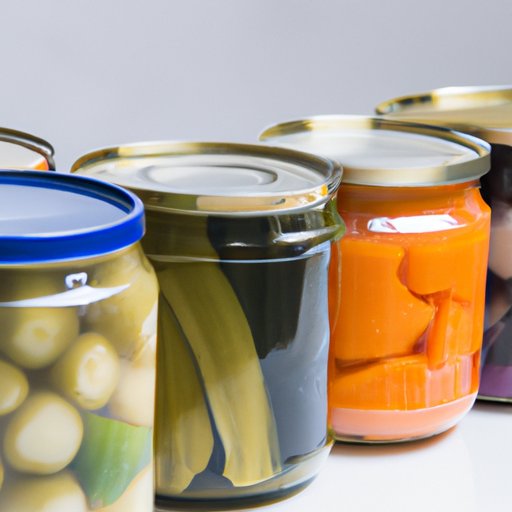Introduction
Canned vegetables offer an easy and affordable way to get your daily dose of veggies, but are they bad for you? While there is no one-size-fits-all answer to this question, it is important to understand the nutritional value, potential health risks and cost benefits of eating canned vegetables in order to make an informed decision about whether or not they are right for your diet.

Analyzing the Nutritional Value of Canned Vegetables
When it comes to nutrition, canned vegetables can provide a good source of vitamins and minerals. Many varieties are packed with fiber, vitamin A and C, calcium, iron and other essential nutrients. However, it is important to read the nutrition label on the can to ensure that you are getting the most nutritional bang for your buck.
In addition to vitamins and minerals, many canned vegetables contain added sodium and sugar. The amount of sodium and sugar added to canned vegetables varies by brand and type, so it is important to compare different brands and types of canned vegetables in order to find the product with the least amount of additives. It is also important to note that some canned vegetables may contain preservatives and pesticides, which can be harmful if consumed in large quantities.
Examining the Potential Health Risks of Eating Canned Vegetables
Canned vegetables can pose certain health risks due to the materials used in their packaging. In particular, many cans are lined with a chemical called bisphenol A (BPA), which has been linked to a number of health issues such as hormonal disruption and cancer. To avoid exposure to BPA, opt for cans labeled “BPA-free” or choose frozen or fresh vegetables instead.
Canned vegetables may also contain traces of pesticides and preservatives, which can be harmful if consumed in large quantities. To reduce your exposure to these chemicals, buy organic canned vegetables whenever possible and rinse them before use.
Comparing the Nutrition in Fresh and Canned Vegetables
Fresh vegetables are generally more nutritious than canned vegetables due to their higher levels of vitamins, minerals and antioxidants. However, canned vegetables can still be a good source of nutrition as long as they are not loaded with salt, sugar and preservatives. It is also important to note that some nutrients, such as vitamin C, can be lost during the canning process.
When comparing the nutrition in fresh and canned vegetables, it is important to consider the cost and convenience of each option. Fresh vegetables tend to be more expensive than canned, but they often have a longer shelf life and require less preparation time. On the other hand, canned vegetables are generally cheaper and more convenient, but they may have a shorter shelf life and require more effort to prepare.
Investigating the Pros and Cons of Eating Canned Vegetables
Eating canned vegetables has both pros and cons. On the plus side, canned vegetables are often cheaper than fresh, require less preparation time and have a longer shelf life. They can also be a good source of vitamins and minerals, depending on the type and brand. On the downside, many canned vegetables contain added salt, sugar and preservatives, which can be unhealthy if consumed in large quantities. In addition, some cans are lined with BPA, which can be dangerous if ingested.
Exploring the Impact of Added Salt, Sugar and Preservatives in Canned Vegetables
The amount of salt, sugar and preservatives added to canned vegetables can vary widely depending on the brand and type. While some canned vegetables are low in sodium and sugar, others can be very high in these ingredients. Eating too much salt, sugar and preservatives can increase the risk of developing health problems such as high blood pressure, diabetes and heart disease. Conversely, consuming too little salt, sugar and preservatives can lead to nutrient deficiencies.

Investigating the Shelf Life of Canned Vegetables
Canned vegetables typically have a long shelf life, but it is important to check the expiration date on the can before consuming them. If the expiration date has passed, it is best to discard the canned vegetables as they may be unsafe to eat. Additionally, it is important to store canned vegetables in a cool, dry place away from direct sunlight to ensure optimal freshness and safety.

Assessing the Cost Benefits of Buying Canned Vegetables
Buying canned vegetables can be a great way to save money. Canned vegetables are usually cheaper than fresh and require less preparation time, making them an economical choice for busy households. However, it is important to compare prices and read labels carefully to ensure that you are getting the most nutritional bang for your buck.
Conclusion
Canned vegetables can be a convenient and affordable way to get your daily dose of veggies, but it is important to be mindful of the nutritional value, potential health risks and cost benefits associated with eating them. Be sure to read labels carefully to ensure that you are choosing the healthiest canned vegetables, and opt for organic and BPA-free products whenever possible. Finally, remember to always store canned vegetables in a cool, dry place and check the expiration date before consuming them.
(Note: Is this article not meeting your expectations? Do you have knowledge or insights to share? Unlock new opportunities and expand your reach by joining our authors team. Click Registration to join us and share your expertise with our readers.)
